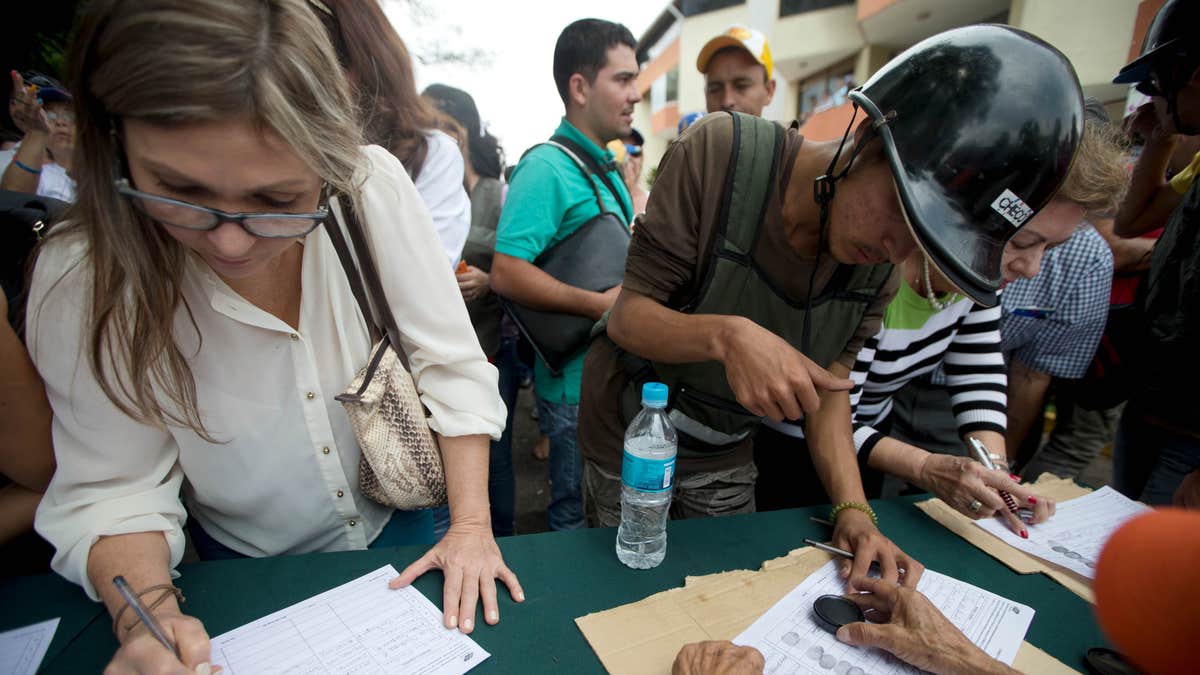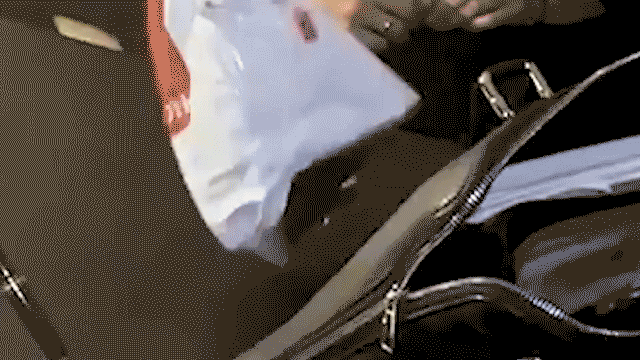
Venezolanos firman una petición que promueve la oposición, para iniciar un referendo revocatorio del mandato del presidente de Venezuela Nicolás Maduro en San Cristóbal, el miércoles 27 de abril de 2016. (Foto AP/Fernando Llano) (ap)
Caracas – It took Venezuelans less than four hours to gather the 195,721 signatures required to initiate the process of recalling President Nicolas Maduro through a referendum vote before the end of the year.
By the end of Thursday, the opposition had amassed more than a million signatures.
In Caracas and other cities throughout the country, crowds approached the signing stations set up on Wednesday and Thursday in parks and plazas to join the petition.
Once the signatures are verified, the government-controlled Consejo Nacional Electoral requires a second batch of signatures to officially call for a referendum and set the vote in motion. In this case, the opposition is mandated to collect some 4 million signatures – or the equivalent of 20 percent of the population.
“I signed because things are not working in Venezuela. There is no food and you have to make lines for everything,” said Hector Pena, who resides in a low-income Caracas neighborhood, to Fox News Latino.
- Venezuelan cellphone carriers suspend international calls, users innovate to stay connected
- Venezuela arrests businessman and his mother in Panama Papers scandal
- In face of crisis, Venezuelans sneak into Colombia for medical treatment
- Venezuela starts rolling blackouts of up to four hours a day amid protests
- Angry Venezuelans take to streets, setting up barricades and raiding shops for food
- Venezuelans hold rival marches for and against government
- Venezuelans start living a ‘new normal’ with rolling blackouts
The success in the gathering of signatures was a much-needed boost for the opposition leadership, whose ability to confront Maduro’s socialist government is being questioned by the increasingly frustrated population enduring triple-digit inflation, a deep recession and widespread shortages.
The latest Venebarometro poll released this week shows the opposition-controlled National Assembly’s approval rating fell 14 percentage points, to 49.8 percent, in just three months.
Experts said the drop as a sign of “frustration” for not getting anything done – thanks in large part to the obstructionism from the Supreme Court, where the majority of justices are openly Chavista.
“Collective frustration is one of the best allies of a regime with little tolerance for dissent,” said Maria Isabel Puerta, political scientist from the Universidad de Carabobo. “The use of the Supreme Court by Chavistas looks to reduce trust on institutions like the National Assembly and tries to delegitimize other democratic expressions like voting,” she told FNL.
Just getting to the point of being able to initiate a recall referendum against Maduro was nerve-wrecking, according to members of the opposition. For example, they say it took CNE more than 90 days to release the forms required to collect the signatures.
“This process should normally take three days, but Chavistas within the CNE delayed it as a way to sabotage,” said Anibal Sanchez, an electoral expert with the opposition’s Democratic Unity Table.
Venezuelans across the nation celebrated on Thursday after seeing the amount of people who showed up to sign the petition.
“This is a day of joy and happiness. Now we really think that the referendum is possible,” Irina Flores, who lives in Catia, Caracas, told FNL after signing. “A change is coming.”
But the opposition is ready for more uphill battles up ahead.
“They released the official forms, but delays will happen again in every step of the process,” said Sanchez. He pointed out that the CNE never released any rules for the collection of signatures, leaving the door open to arbitrary vetoes.
“They kept the right to invent ways to eliminate or question some of the signatures if they want,” he said.
At this point, a referendum is the only means left for the opposition to try and terminate Maduro’s government before his term ends in 2019. Earlier this week the Supreme Court ruled against the possibility of modifying the Constitution in order to reduce the length of the presidential term.
The ruling forced all the political parties that make up the opposition coalition to rally behind the idea of a referendum.
“Right now we are backing this plan with all we’ve got. But this is as long as the referendum is done this year, not in 2017,” said Ismael Leon, a congressman from Voluntad Popular.
This deadline is significant because if Maduro were to be revoked after the end of 2016, his vice president – and ally – Aristobulo Isturiz would be automatically allowed to govern the two remaining years.
Opposition leaders are warning that the government could delay the referendum until next year with the excuse that public offices now are operating just two days a week as mandated by the government in order to save electricity and prevent a major energy crisis.
“If we realize that that is going to be the case, other options will have to be considered, such as massive protests or calling for a Constituent Assembly to modify the Constitution and replace all the elected officials,” Congressman Leon said.
According to the Venebarometro poll, currently 60.3 percent of Venezuelans want a referendum. And if it were held today, Maduro would lose by more than 30 points, according to the poll.








































